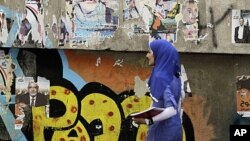WASHINGTON —
U.S. Secretary of State John Kerry said Tuesday Egypt’s trial of representatives for non-government organizations was politically motivated and incompatible with its transition to democracy.
Kerry issued the tough statement after a criminal court in Cairo convicted 43 NGO workers on charges of illegally using foreign funding to foment civil unrest.
“The United States is deeply concerned by the guilty verdicts and sentences, including the suspended sentences, handed down by an Egyptian court against 43 NGO representatives in what was a politically-motivated trial,” Kerry said. “This decision runs contrary to the universal principle of freedom of association and is incompatible with the transition to democracy.”
The Egyptian court ordered the closure of the non-governmental organizations (NGOs) involved in the case, including the U.S.-based International Republican Institute (IRI), National Democratic Institute (NDI) and Freedom House.
Kerry said the closure order on the NGO offices and the seizure of their assets “contradicts the Government of Egypt’s commitments to support the role of civil society.” He urged President Mohamed Morsi’s government to “work with civic groups as they respond to the Egyptian people’s aspirations for democracy as guaranteed in Egypt’s new constitution.”
The U.S. position as explained in Kerry’s statement argued that international NGOs play a legitimate role in any democracy and are critical to advancing freedoms, supporting universal human rights, giving voice to citizens’ views, and acting as appropriate checks on the government.
The U.S.-based groups were training Egyptians in advocacy, voter education and election monitoring.
Kerry issued the tough statement after a criminal court in Cairo convicted 43 NGO workers on charges of illegally using foreign funding to foment civil unrest.
“The United States is deeply concerned by the guilty verdicts and sentences, including the suspended sentences, handed down by an Egyptian court against 43 NGO representatives in what was a politically-motivated trial,” Kerry said. “This decision runs contrary to the universal principle of freedom of association and is incompatible with the transition to democracy.”
The Egyptian court ordered the closure of the non-governmental organizations (NGOs) involved in the case, including the U.S.-based International Republican Institute (IRI), National Democratic Institute (NDI) and Freedom House.
Kerry said the closure order on the NGO offices and the seizure of their assets “contradicts the Government of Egypt’s commitments to support the role of civil society.” He urged President Mohamed Morsi’s government to “work with civic groups as they respond to the Egyptian people’s aspirations for democracy as guaranteed in Egypt’s new constitution.”
The U.S. position as explained in Kerry’s statement argued that international NGOs play a legitimate role in any democracy and are critical to advancing freedoms, supporting universal human rights, giving voice to citizens’ views, and acting as appropriate checks on the government.
The U.S.-based groups were training Egyptians in advocacy, voter education and election monitoring.
|
Most of the 16 Americans who would have been affected by the verdicts had left the country months ago, so the ruling was made in their absence. The Americans sentenced in absentia include the son of U.S. Transportation Secretary Ray LaHood. The American who stayed behind is Robert Becker, a former NDI employee. American NGO’s Response The National Democratic Institute (NDI) said it was “shocked and deeply distressed” by the verdicts. “The verdict also has a chilling effect on the important efforts of civil society in Egypt.” The NDI said. "The Institute will do whatever it can to clear the names of its innocent employees." The International Republican Institute described the Egyptian trial and verdicts as a “politically motivated effort to squash Egypt’s growing civil society.” The Washington-based Middle East Institute (MEI) also condemned the verdicts, including the five-year sentence handed down for Charles Dunne, an MEI scholar and director of Freedom House’s Middle East and North Africa programs. "The convictions represent a serious setback for civil society in Egypt and reflect a disturbing trend in countries from Egypt to Russia," said Middle East Institute president, Wendy Chamberlin. In a statement, Dunne called upon the U.S. government and Congress to make clear to President Morsi that "the continued persecution of civil society activists is a grave breach of his stated commitment to a democratic transition." More controversy to be expected In the ongoing controversy over Egypt's restrictions on NGOs, the Morsi government recently sent to the interim legislature a new draft NGO law that would allow the government to control the activities and funding of non-profit organizations. Civil rights campaigners in Egypt saw it as part of a concerted campaign against NGOs waged by remnants of the Mubarak administration to block any moves to expand democracy. "The verdict is obviously going to have a chilling effect on the climate for civil society in Egypt, but that's already been happening for some time," said Shadi Hamid, director of research at the Brookings Doha Centre, a think-tank based in the Gulf region. |




